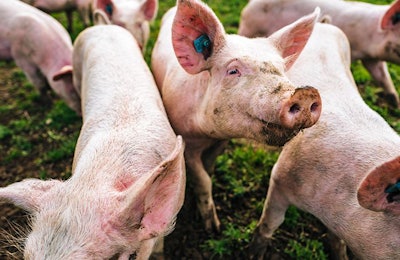
While further African swine fever outbreaks in domestic swine are recorded in 4 European countries — North Macedonia, Romania, Russia and Serbia — the disease situation has been officially closed in the German state of Lower Saxony.
Over the past 10 days, new cases of African swine fever (ASF) in domestic pigs have been recorded by the veterinary authorities of four European nations.
Only Romania has confirmed an outbreak on a commercial farm. Affected was a premises in the central region of Timis, starting on October 9. According to the official notification to the World Organisation for Animal Health (WOAH), more than 400 of the 39,191 animals at the farm died.
Furthermore, three other outbreaks in Romanian swine were confirmed in Romania this month. These occurred in backyard herds, each with between three and seven pigs.
Since October 2019, Romania has been battling ASF in an ongoing disease outbreak series. Affected have been mainly domestic pigs in backyard herds and wild boar across the south, southeast and central counties of the country.
In the southeast European state of North Macedonia, ASF virus has been detected in four more herds of domestic pigs. Herd sizes ranged from five to 67 animals.
Of the latest outbreaks, three were in municipalities in the Northeastern region, and bordering Serbia. As for the nation’s 26 previously reported outbreaks, the other recently affected premises was in the Eastern region.
At the end of last year, ASF was first detected in North Macedonia. Since then, WOAH has been notified of outbreaks in involving 1,088 domestic pigs, and there have been 11 cases in wild boar.
Disease ‘resolved’ in German state
The ASF situation is now “closed” in the northwestern state of Lower Saxony, according to the latest report from the animal health agency to WOAH.
In early July, presence of the ASF virus was confirmed after 13 pigs died at a farm in the Emsland district. The remaining 1,817 animals at the premises were culled, and no further cases in the state have since been detected. It remains unclear how the infection was transmitted to the farm. This was the latest of seven confirmed ASF outbreaks in domestic pigs in Germany over the past two years.
New outbreaks in European pigs
Since January 1, the number of confirmed ASF outbreaks in domestic pigs in Europe has reached 436.
This is according to the Animal Disease Information System of the European Commission (EC; as of October 14). So far this year, 12 European states have now officially registered one or more ASF outbreaks through this system.
For comparison, 11 European states registered a total of 1,874 ASF outbreaks with the EC over the whole of 2021.
Registering the most outbreaks in 2022 has been Romania with 248. This is followed by Serbia whose total has reached 98 for the year so far. Only these two countries and North Macedonia have registered new cases in domestic swine with the EC since the start of October.
Europe’s wild boar total for year passes 5,500
So far this year, 5,575 ASF outbreaks among wild boar have occurred in Europe, according to the EC notification system (as of October 14).
Registering one or more outbreaks in 2022 have been 14 of the continent’s states.
Within this population, recording the most outbreaks with the EC in 2022 has been Poland (1,547), followed by Germany (1,239), Latvia (647), Hungary (482), Slovakia (462) and Romania (371).
Since the previous update from this source (dated October 1), Estonia, Lithuania and Serbia have also registered new cases in wild boar though this system.
For comparison, 12 countries confirmed with the EC one or more ASF cases among the wild population — a total of 12,150 outbreaks — during the whole of 2021.
Including cases suspected over the period September 2 to October 3, the number of ASF outbreaks among wild boar in Poland so far this year stands at 1,426. This is according to the nation’s chief veterinary office in its most recent report dated October 13. This included animals found to be infected with ASF in eight provinces.
In Germany over the past two years, 4,356 wild boar have tested positive for the ASF virus (as of October 20), according to national veterinary agency, the Friedrich-Loeffler Institute. This was an increase of 29 animals since October 7.
Since the start of last month, new cases have been detected in wild boar in three of the nation’s eastern states — Brandenburg, Saxony and Mecklenburg-West Pomerania — according to the same source.
Update on ASF situation in western Russia
While the EC System does not cover the disease situation in Russia, the national animal health agency notifies WOAH about developments in the disease in domestic pigs and wild boar.
All of Russia’s latest cases reported to WOAH have been in the Volga federal district.
Over the past 10 days, the authority has registered with WOAH new outbreaks affecting two non-commercial pig herds in Samara. With herds of 64 and 77 pigs, the premises were in the same district of this region. Three wild boar in Samara have also tested positive for the ASF virus since the start of this month.
In the Saratov region, three more wild boar infected with the disease have been found. Four wild boar have tested positive for the virus in the Republic of Tatarstan.
After periods when no new ASF cases have been detected, the Russian authorities have declared to WOAH that the disease situation has been resolved in three regions of the Central federal district, and one each in the Southern and Volga districts.
View our continuing coverage of the global African swine fever situation.


















